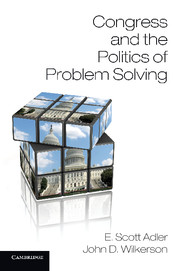Book contents
- Frontmatter
- Contents
- Tables and Figures
- Preface
- Part I
- Part II
- Part III
- Part IV
- 8 Problem Solving and Policy Focal Points
- 9 Problem Solving and the Dynamics of Policy Change
- 10 Problem Solving and American Politics
- Appendix A
- Appendix B Assignment of Bills across Issue Types
- Appendix C Calculating Committee Roll Rates
- Bibliography
- Index
9 - Problem Solving and the Dynamics of Policy Change
Published online by Cambridge University Press: 05 January 2013
- Frontmatter
- Contents
- Tables and Figures
- Preface
- Part I
- Part II
- Part III
- Part IV
- 8 Problem Solving and Policy Focal Points
- 9 Problem Solving and the Dynamics of Policy Change
- 10 Problem Solving and American Politics
- Appendix A
- Appendix B Assignment of Bills across Issue Types
- Appendix C Calculating Committee Roll Rates
- Bibliography
- Index
Summary
In this chapter we investigate policy change – a core function of all legislatures. The previous chapter examined congressional issue attention over time through the practice of bill sponsorship. This chapter asks whether the same factors that predict issue attention also predict “macrobehavioral” outcomes (Adler and Lapinski 2006). Whereas the decision to sponsor a bill is an individual one, policy change requires collective action – both in terms of setting the issue agenda and in terms of deciding whether current policy will be reformed. Are indicators of problem-solving considerations – such as program expirations and issue salience – also better predictors of both the timing and significance of policy changes?
To date, studies of policy change in legislatures have primarily focused on statutory change – when are laws reformed or repealed? Accordingly, the first part of our analysis replicates and then extends an important approach to exploring why “major” laws are significantly amended for the first time. After first replicating that approach, we test more encompassing definitions of the dependent variable to ask whether the scope of the “significant” revisions examined impacts the findings. We then operationalize policy change in an entirely new way. Here, the dependent variable is not whether a law is amended (for the first time) but a continuous measure of the total amount of statutory change within each of twenty-seven policy areas.
- Type
- Chapter
- Information
- Congress and the Politics of Problem Solving , pp. 167 - 196Publisher: Cambridge University PressPrint publication year: 2013



